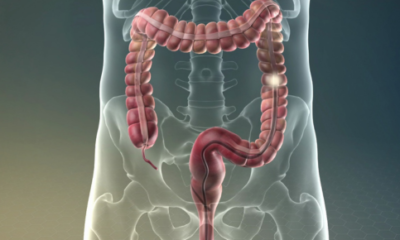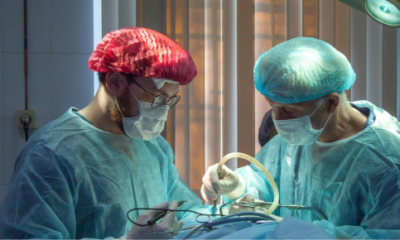Health
Allergy Medicine Side Effects – What You Need to Know
1. Introduction to Allergy Medicines
Allergy medicines are essential for managing symptoms like sneezing, itching, and congestion caused by allergies. While effective, these medications can also have side effects. Understanding these potential side effects is crucial for safe and effective use.
2. Common Types of Allergy Medicines
There are several types of allergy medicines, including antihistamines, decongestants, corticosteroids, and leukotriene inhibitors. Each type works differently to alleviate allergy symptoms and has its own set of potential side effects.
3. Antihistamines: How They Work
Antihistamines block histamine, a substance produced during an allergic reaction. They are commonly used to treat symptoms such as sneezing, itching, and runny nose. Common antihistamines include loratadine (Claritin), cetirizine (Zyrtec), and diphenhydramine (Benadryl).
4. Common Side Effects of Antihistamines
Antihistamines can cause side effects such as drowsiness, dry mouth, dizziness, and blurred vision. Newer antihistamines, like loratadine and cetirizine, are less likely to cause drowsiness compared to older ones like diphenhydramine.
5. Decongestants: How They Work
Decongestants relieve nasal congestion by narrowing blood vessels in the nasal passages. Common decongestants include pseudoephedrine (Sudafed) and phenylephrine. They are often used in combination with antihistamines for comprehensive allergy relief.
6. Common Side Effects of Decongestants
Decongestants can cause side effects such as increased heart rate, elevated blood pressure, insomnia, and nervousness. People with heart conditions or hypertension should use decongestants with caution and under medical supervision.
7. Corticosteroids: How They Work
Corticosteroids reduce inflammation and are used to treat a variety of allergy symptoms, including nasal congestion and skin rashes. They are available in different forms, such as nasal sprays (Flonase), inhalers, and topical creams.
8. Common Side Effects of Corticosteroids
Corticosteroids can cause side effects like nasal irritation, nosebleeds, and sore throat when used as nasal sprays. Long-term use of oral corticosteroids can lead to more serious side effects, including weight gain, high blood pressure, and osteoporosis.
9. Leukotriene Inhibitors: How They Work
Leukotriene inhibitors, such as montelukast (Singulair), block the action of leukotrienes, which are substances that cause allergy symptoms. These medications are used to manage allergic rhinitis and asthma.
10. Common Side Effects of Leukotriene Inhibitors
Leukotriene inhibitors can cause side effects like headache, stomach pain, cough, and mood changes. In rare cases, they may be associated with serious side effects such as suicidal thoughts or actions.
11. Drowsiness and Fatigue
Drowsiness and fatigue are common side effects of many allergy medicines, particularly older antihistamines like diphenhydramine. These effects can impact daily activities and should be considered when choosing an allergy medication.
12. Dry Mouth and Throat
Dry mouth and throat are common side effects of antihistamines and decongestants. Staying hydrated and using saliva substitutes can help manage these symptoms. If dry mouth persists, consult a healthcare provider.
13. Dizziness and Lightheadedness
Dizziness and lightheadedness can occur with antihistamines and decongestants. These symptoms can increase the risk of falls, particularly in older adults. It’s important to be cautious when standing up quickly or operating machinery.
14. Insomnia and Sleep Disturbances
Insomnia and sleep disturbances are potential side effects of decongestants due to their stimulating effects. To minimize these effects, avoid taking decongestants close to bedtime and consider using a different class of allergy medication if sleep issues persist.
15. Increased Heart Rate and Blood Pressure
Decongestants can increase heart rate and blood pressure, posing a risk for individuals with cardiovascular conditions. Monitoring your heart rate and blood pressure and consulting with a healthcare provider is important if you have pre-existing heart conditions.
16. Mood Changes and Anxiety
Some allergy medications, particularly leukotriene inhibitors, can cause mood changes and anxiety. If you experience significant mood alterations or anxiety while taking these medications, contact your healthcare provider for guidance.
17. Gastrointestinal Issues
Gastrointestinal issues such as nausea, stomach pain, and diarrhea can occur with some allergy medications. Taking medication with food, staying hydrated, and following dosing instructions can help minimize these side effects.
18. Nasal Irritation and Nosebleeds
Nasal corticosteroids can cause nasal irritation and nosebleeds. Using the spray correctly, such as aiming it away from the nasal septum and using a saline rinse, can help reduce these side effects.
19. Skin Reactions
Topical corticosteroids used for skin allergies can cause skin thinning, stretch marks, and discoloration with prolonged use. It’s important to use these medications as directed and to avoid overuse to prevent skin damage.
20. Blurred Vision and Eye Issues
Some allergy medications can cause blurred vision and other eye issues. If you experience changes in vision, contact your healthcare provider. Avoiding activities that require clear vision, such as driving, until vision normalizes is advisable.
21. Weight Gain and Metabolic Changes
Long-term use of oral corticosteroids can lead to weight gain and metabolic changes, including increased blood sugar levels. Monitoring weight and blood sugar and maintaining a healthy diet and exercise routine can help manage these side effects.
22. Allergic Reactions to Allergy Medications
In rare cases, individuals can have allergic reactions to allergy medications themselves. Symptoms can include hives, swelling, and difficulty breathing. If you suspect an allergic reaction to a medication, seek medical attention immediately.
23. Interaction with Other Medications
Allergy medications can interact with other medications, potentially increasing the risk of side effects or reducing effectiveness. Always inform your healthcare provider about all medications and supplements you are taking to avoid harmful interactions.
24. Special Considerations for Children and Elderly
Children and the elderly may be more susceptible to side effects of allergy medications. Lower doses and careful monitoring are often required. Consult with a healthcare provider to determine the safest and most effective treatment options for these age groups.
25. Conclusion: Safe Use of Allergy Medications
While allergy medications are effective in managing symptoms, being aware of potential side effects is crucial for safe use. Always follow dosing instructions, consult with healthcare providers, and report any adverse reactions to ensure optimal treatment and safety. Understanding how to balance the benefits and risks of these medications helps maintain overall health and well-being.
///////////////////////////////////////////////
Health
Discovering Carolina Colorectal Surgery – Excellence in Patient Care
1. Introduction to Carolina Colorectal Surgery
Carolina Colorectal Surgery is a leading medical practice dedicated to providing comprehensive care for patients with colorectal conditions. With a team of experienced surgeons and staff, they offer personalized treatment and support.
2. Expert Surgeons
The practice boasts a team of expert colorectal surgeons with extensive training and experience in treating a wide range of colorectal disorders. Patients can trust in the expertise of these skilled professionals.
3. Specialized Care
Carolina Colorectal Surgery specializes in the diagnosis and treatment of colorectal conditions, including colorectal cancer, inflammatory bowel disease, hemorrhoids, and anal fissures. They offer individualized care plans tailored to each patient’s needs.
4. State-of-the-Art Facilities
The practice is equipped with state-of-the-art facilities and technology to ensure the highest quality of care. From advanced diagnostic tools to minimally invasive surgical techniques, patients receive cutting-edge treatment options.
5. Comprehensive Services
Carolina Colorectal Surgery provides a wide range of services, including colonoscopies, endoscopic procedures, laparoscopic surgery, and robotic-assisted surgery. They offer comprehensive care from diagnosis to postoperative follow-up.
6. Colonoscopies
Colonoscopies are a vital screening tool for detecting colorectal cancer and other gastrointestinal conditions. Carolina Colorectal Surgery performs colonoscopies with precision and accuracy, ensuring early detection and treatment.
7. Endoscopic Procedures
Endoscopic procedures, such as sigmoidoscopies and polypectomies, are used to diagnose and treat colorectal conditions. The practice offers these procedures in a comfortable and safe environment.
8. Minimally Invasive Surgery
Many colorectal surgeries can be performed using minimally invasive techniques, such as laparoscopy and robotic-assisted surgery. These approaches offer benefits such as smaller incisions, less pain, and faster recovery.
9. Robotic-Assisted Surgery
Robotic-assisted surgery allows for greater precision and control during colorectal procedures. Carolina Colorectal Surgery utilizes robotic technology to enhance surgical outcomes and improve patient recovery.
10. Treatment for Colorectal Cancer
The practice provides comprehensive treatment options for colorectal cancer, including surgery, chemotherapy, and radiation therapy. Their multidisciplinary approach ensures that patients receive the best possible care.
11. Management of Inflammatory Bowel Disease
Carolina Colorectal Surgery offers specialized care for patients with inflammatory bowel disease (IBD), including Crohn’s disease and ulcerative colitis. They work closely with gastroenterologists to manage symptoms and improve quality of life.
12. Hemorrhoid Treatment
Hemorrhoids are a common colorectal condition that can cause discomfort and pain. The practice offers various treatment options for hemorrhoids, including minimally invasive procedures and surgical removal if necessary.
13. Anal Fissure Management
Anal fissures are tears in the lining of the anus that can be painful and affect bowel movements. Carolina Colorectal Surgery provides effective management strategies, including dietary changes, medications, and surgical intervention when needed.
14. Patient-Centered Approach
The practice prioritizes patient-centered care, focusing on open communication, compassion, and respect for individual preferences. Patients are actively involved in their treatment decisions and receive support throughout their journey.
15. Collaborative Care
Carolina Colorectal Surgery collaborates closely with primary care physicians, gastroenterologists, oncologists, and other specialists to ensure coordinated and comprehensive care for patients. This multidisciplinary approach leads to better outcomes.
16. Education and Support
The practice offers patient education resources and support services to help individuals understand their condition and treatment options. They empower patients to take an active role in managing their colorectal health.
17. Research and Innovation
Carolina Colorectal Surgery is committed to advancing the field of colorectal surgery through research and innovation. They participate in clinical trials and research studies to improve treatment outcomes and quality of life for patients.
18. Community Outreach
The practice engages in community outreach activities to raise awareness about colorectal health and preventive measures. They participate in health fairs, educational seminars, and screenings to promote early detection and intervention.
19. Quality and Safety
Carolina Colorectal Surgery adheres to the highest standards of quality and safety in patient care. They implement strict protocols and guidelines to minimize risks and ensure optimal outcomes for every procedure.
20. Patient Satisfaction
Patient satisfaction is a priority for Carolina Colorectal Surgery, and they continuously seek feedback to improve their services. Many patients express gratitude for the compassionate care and excellent results they receive.
21. Accessibility and Convenience
The practice strives to make colorectal care accessible and convenient for patients. They offer flexible scheduling, telemedicine appointments, and multiple locations for consultations and follow-up visits.
22. Insurance Coverage
Carolina Colorectal Surgery accepts most major insurance plans, making their services accessible to a broad range of patients. They also assist patients in navigating insurance coverage and financial matters.
23. Cultural Sensitivity
The practice respects the cultural and linguistic diversity of their patients and ensures that language and cultural barriers are addressed effectively. They provide interpreter services and culturally sensitive care to meet individual needs.
24. Continuing Education for Providers
The surgeons and staff at Carolina Colorectal Surgery engage in ongoing education and training to stay updated on the latest advancements in colorectal surgery. They are committed to lifelong learning and professional development.
25. Conclusion: Trusted Colorectal Care
Carolina Colorectal Surgery stands as a trusted provider of colorectal care, offering expertise, compassion, and comprehensive services to improve the health and well-being of patients. With a commitment to excellence, they continue to set the standard for colorectal surgery in the region.
Health
Navigating Your Colorectal Surgery Outpatient Appointment – What to Expect
1. Introduction to Colorectal Surgery Outpatient Appointments
Colorectal surgery outpatient appointments are essential for post-operative care and monitoring following colorectal surgeries. Understanding what to expect can help patients prepare for their appointments.
2. Appointment Scheduling
Appointments are typically scheduled based on the surgeon’s recommendations, considering the type of surgery performed and the patient’s recovery progress.
3. Pre-Appointment Instructions
Patients may receive specific instructions before their appointment, such as fasting requirements or medication adjustments. It’s crucial to follow these instructions carefully for accurate assessment.
4. Check-In Process
Upon arrival, patients will check in at the reception desk or registration area. They may need to provide insurance information, identification, and any necessary paperwork.
5. Vital Signs Assessment
A nurse or medical assistant will take the patient’s vital signs, including blood pressure, heart rate, temperature, and weight. This helps track the patient’s overall health status.
6. Review of Symptoms
The healthcare provider will review the patient’s symptoms, including any pain, discomfort, or changes in bowel habits since the surgery. Patients should be prepared to provide detailed information.
7. Physical Examination
The surgeon will perform a physical examination, focusing on the surgical site and surrounding areas. This may involve palpation, inspection, and assessment of wound healing.
8. Discussion of Test Results
If any tests or imaging studies were performed, the results will be discussed during the appointment. This may include laboratory tests, imaging scans, or diagnostic procedures.
9. Medication Management
The surgeon may review the patient’s medication regimen and make adjustments as needed. This ensures optimal pain management and supports the healing process.
10. Wound Care Instructions
Patients will receive instructions on how to care for their surgical incision or wounds at home. This may include cleaning techniques, dressing changes, and signs of infection to watch for.
11. Dietary Recommendations
Dietary recommendations may be provided based on the patient’s surgical procedure and recovery status. This may include dietary restrictions, modifications, or nutritional supplements.
12. Activity Restrictions
Patients may be advised on activity restrictions or limitations during the recovery period. This ensures that they do not strain themselves or compromise the surgical outcome.
13. Follow-Up Appointments
The surgeon will schedule follow-up appointments as needed to monitor the patient’s progress and address any concerns or complications. These appointments are crucial for ongoing care.
14. Education and Counseling
Patients will receive education and counseling on their condition, treatment plan, and expectations for recovery. This empowers them to actively participate in their care and make informed decisions.
15. Support Services Referral
Patients may be referred to support services such as physical therapy, nutrition counseling, or psychological support to aid in their recovery and overall well-being.
16. Financial Counseling
Financial counselors may be available to discuss insurance coverage, billing, and payment options for surgical procedures and follow-up care.
17. Transportation and Accessibility
Patients should arrange transportation to and from the appointment, especially if they are still recovering from surgery and unable to drive themselves.
18. Time Management
Patients should plan for sufficient time for their appointment, as wait times may vary depending on the clinic’s schedule and the complexity of the patient’s case.
19. Communication with Healthcare Team
Open communication with the healthcare team is essential. Patients should feel comfortable asking questions, expressing concerns, and seeking clarification about their care.
20. Caregiver Involvement
Caregivers may accompany patients to the appointment to provide support and assist with understanding instructions and information provided during the visit.
21. Documentation and Records
Patients should keep copies of all medical records, test results, and instructions provided during the appointment for reference and continuity of care.
22. Emergency Contact Information
Patients should have access to emergency contact information for the healthcare provider or clinic in case of any urgent concerns or complications.
23. Post-Appointment Follow-Up
After the appointment, patients should follow any post-appointment instructions provided by the healthcare provider and schedule any recommended follow-up tests or appointments.
24. Patient Feedback
Patients are encouraged to provide feedback about their experience during the outpatient appointment, including any suggestions for improvement or areas of concern.
25. Conclusion: Partnering for Successful Recovery
Colorectal surgery outpatient appointments play a crucial role in the post-operative care and recovery process. By actively participating in their care and following the guidance of their healthcare team, patients can achieve successful outcomes and improved quality of life.
Health
Exploring the Expertise of Dr. Smeltzer in Cardiothoracic Surgery
1. Introduction to Dr. Smeltzer
Meet Dr. Smeltzer, a renowned cardiothoracic surgeon known for his expertise and dedication to patient care. With years of experience, Dr. Smeltzer has earned a reputation for excellence in the field of cardiothoracic surgery.
2. Education and Training
Dr. Smeltzer completed his medical education and specialized training in cardiothoracic surgery from prestigious institutions. His extensive training has equipped him with the knowledge and skills needed to perform complex surgeries.
3. Board Certification
Dr. Smeltzer is board-certified in cardiothoracic surgery, demonstrating his commitment to meeting the highest standards of medical practice. Board certification ensures that he has undergone rigorous testing and meets stringent criteria for competency.
4. Areas of Expertise
Dr. Smeltzer specializes in a wide range of cardiothoracic procedures, including coronary artery bypass grafting (CABG), valve repair and replacement, lung resection, and heart transplant. His expertise covers both adult and pediatric patients.
5. Coronary Artery Bypass Grafting (CABG)
CABG is a surgical procedure used to improve blood flow to the heart by bypassing blocked or narrowed coronary arteries. Dr. Smeltzer has extensive experience in performing CABG surgeries with excellent outcomes.
6. Valve Repair and Replacement
Valve repair and replacement surgeries are performed to treat conditions such as mitral valve prolapse and aortic stenosis. Dr. Smeltzer’s expertise in these procedures ensures optimal outcomes for patients.
7. Lung Resection
Lung resection surgeries involve the removal of a portion of the lung affected by conditions like lung cancer or infection. Dr. Smeltzer employs advanced techniques to achieve successful outcomes in lung resection procedures.
8. Heart Transplant
Heart transplant surgery is a life-saving procedure for patients with end-stage heart failure. Dr. Smeltzer has the skills and experience to perform heart transplant surgeries with compassion and precision.
9. Minimally Invasive Techniques
Dr. Smeltzer is proficient in minimally invasive cardiothoracic surgery techniques, which offer benefits such as smaller incisions, reduced pain, and faster recovery times for patients.
10. Robotic-Assisted Surgery
Robotic-assisted surgery allows for greater precision and control during complex cardiothoracic procedures. Dr. Smeltzer utilizes robotic technology to enhance surgical outcomes and patient satisfaction.
11. Multidisciplinary Approach
Dr. Smeltzer believes in a multidisciplinary approach to patient care, collaborating closely with other specialists to develop comprehensive treatment plans tailored to each patient’s unique needs.
12. Commitment to Patient Safety
Patient safety is a top priority for Dr. Smeltzer and his team. They adhere to strict protocols and guidelines to ensure the highest standards of safety and quality in every surgical procedure.
13. Compassionate Care
Dr. Smeltzer is known for his compassionate bedside manner and personalized approach to patient care. He takes the time to listen to his patients’ concerns and provides them with the support they need throughout their treatment journey.
14. Innovative Research
Dr. Smeltzer is actively involved in research and clinical trials aimed at advancing the field of cardiothoracic surgery. His contributions to medical science help improve patient outcomes and treatment options.
15. Continuing Education
To stay at the forefront of his field, Dr. Smeltzer regularly participates in continuing medical education and professional development activities. He is committed to lifelong learning and staying updated on the latest advancements in cardiothoracic surgery.
16. Patient Testimonials
Many patients have shared their positive experiences under Dr. Smeltzer’s care, praising his skill, professionalism, and compassionate demeanor. Patient testimonials serve as a testament to his dedication to excellence.
17. Community Involvement
Dr. Smeltzer actively contributes to his community through educational initiatives, public awareness campaigns, and volunteer work. He is dedicated to improving the health and well-being of those around him.
18. Recognition and Awards
Dr. Smeltzer has received recognition and awards for his contributions to the field of cardiothoracic surgery. These accolades underscore his commitment to excellence and patient care.
19. Accessibility and Availability
Dr. Smeltzer and his team strive to make themselves accessible to patients, providing timely appointments and responsive communication. They understand the importance of addressing patient concerns promptly.
20. Collaboration with Referring Physicians
Dr. Smeltzer maintains open lines of communication with referring physicians to ensure seamless coordination of care for patients. Collaboration and teamwork are essential components of his practice.
21. International Reputation
Dr. Smeltzer’s expertise in cardiothoracic surgery has earned him an international reputation. Patients from around the world seek his services for complex surgical procedures and specialized care.
22. Philanthropic Endeavors
Dr. Smeltzer is actively involved in philanthropic endeavors aimed at improving access to healthcare and supporting medical research. He believes in giving back to the community and making a positive impact on society.
23. Patient Education and Empowerment
Dr. Smeltzer prioritizes patient education, empowering his patients to make informed decisions about their health and treatment options. He takes the time to explain procedures, risks, and benefits in detail.
24. Future Directions
Dr. Smeltzer continues to push the boundaries of cardiothoracic surgery, exploring innovative techniques and technologies to further improve patient outcomes and quality of life.
25. Conclusion: Exceptional Care
Dr. Smeltzer’s commitment to excellence, compassionate approach, and dedication to advancing the field of cardiothoracic surgery make him a trusted choice for patients
-

 Beauty2 years ago
Beauty2 years agoBuilding Strong Teeth – Expert Advice
-

 Health2 years ago
Health2 years agoSouth Korean Plastic Surgery Before and After – Transformations and Trends
-

 Dental2 years ago
Dental2 years agoTop 5 Dental Hospitals – India
-

 Health2 years ago
Health2 years agoTop 5 Cardiac Hospitals – Australia
-

 Beauty2 years ago
Beauty2 years agoEffective Hair Care Practices
-

 Fitness2 years ago
Fitness2 years agoTips for Healthy and Active Living
-

 Beauty2 years ago
Beauty2 years agoEffective Skin Care Practices
-

 Health2 years ago
Health2 years ago25 Effective Ways to Treat Skin Allergies at Home


















